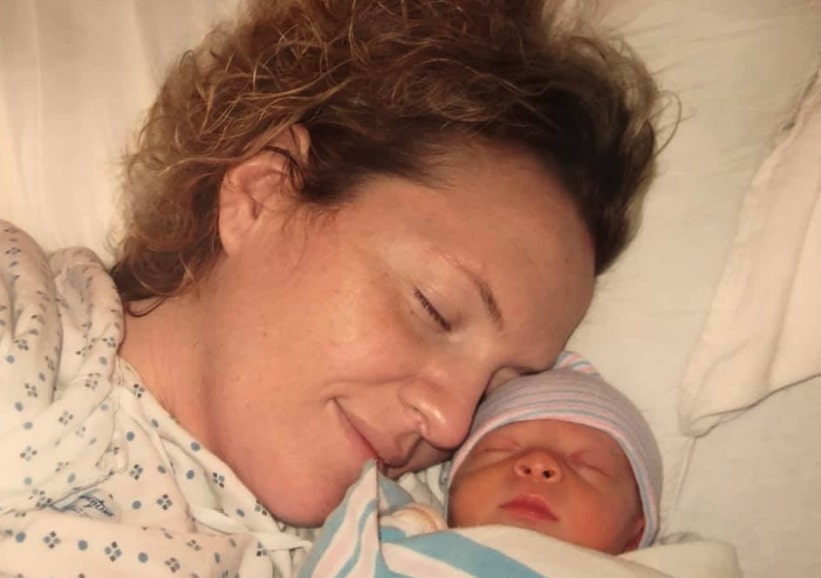After a decade of infertility, Adrianna Keizer-D’Anna and her husband Nicholas were going to try once more until the coronavirus pandemic devastatingly altered their plans.
Keizer-D’Anna battled six miscarriages along with eight failed IVF transfers before they made the decision to make their pregnancy dreams come true.
Keizer-D’Anna shares in a new essay on how getting pregnant with her first child was a breeze but the nine months that followed were anything but. Four months after her 2008 wedding, she became pregnant with her daughter Sophia, who is now 10.
“It was a high-risk pregnancy,” Keizer-D’Anna wrote. “I was constantly vomiting and lost almost 20 lbs. There was low fetal growth and I showed signs of pre-eclampsia. I was in and out of the hospital throughout the pregnancy and gave birth by C-section at 37 weeks.”
Doctors believed the reasons for her complications were due to the gastric bypass she had in 2006.
But her dreams of having a second child were close to her heart — despite the long and arduous journey. She shared with People the painful process:
“After nine egg retrievals, 12 transfers, four clinics, six surgeries (including having both of my tubes removed due to damage from all the retrievals), an attempt to remove my uterine septum, 60 lbs. of weight gain from the various medications and much more, I was lucky to get pregnant via IVF in October 2017.”
But at six weeks, she soon miscarried, and then the following year, in 2018, at just five weeks.
RELATED: Pregnant Nurse Dies of COVID-19 Shortly After Colleagues Saved Her Baby
“Both of these pregnancies were through transfers of my own embryos,” she revealed.
Thanks to extensive testing, doctors were led to believe another condition might also be playing a role in her multiple miscarriages.
“At that time, I tested positive for elevated NK cells, which play a vital role in immune system functioning,” she shared. “Your body intentionally rejects embryos, not recognizing them as a part of you but as a ‘foreign object.'”
While there are treatments for this, she shared they are not only expensive but they are very hard on the body which can lead to side effects including blurred vision, panic attacks, night sweats, and more.
“It was three months of pure hell, and I did it two times,” Keizer-D’Anna shared. “It was all very costly and I still miscarried. The doctor was at a loss. I had literally done every course of treatment.”
The couple was then advised to try donor eggs — something Keizer-D’Anna admits was both a difficult and emotional decision.
“We only had one viable embryo from the batch of eggs we bought (and fertilized with my husband’s sperm),” she shared with the magazine. “We transferred that one in March 2019, along with one of my own embryos.”
But when both failed to implant, she says she was devasted as at that point, they were both emotionally and financially drained. Between loans and credit card bills, they were $80,000 in debt. They also had borrowed from their retirement accounts in hopes of a transfer finally working.
Despite it all – they decided to try IVF one last time and went for a final retrieval in April of 2019. From that retrieval, they extracted two viable embryos.
And Then, the Coronavirus Pandemic Hit
RELATED: CNN’s Chris Cuomo’s 10-Year-Old Son Contracts COVID-19 After Both Mom and Dad Battled the Illness
“Many doctors believe that it can be disastrous on older eggs to test them and the results are still a crapshoot,” she shared. “Plus, it costs thousands of dollars and we are literally out of money.”
And in March of 2020, the couple was ready to move forward with the transfer. But the novel coronavirus had other plans.
“I began my new cycle on my birthday, March 6, but was told not to start any medications just yet due to the uncertainty of the virus trajectory,” Keizer-D’Anna wrote. “The following morning, I was informed by my clinic that no new cycles were to start until further notice.”
She was floored.
“Never in a million years did I think COVID-19 would impact my transfer,” she shared with People. “Unfortunately, I had already ordered my medication, and it can’t be returned: $500 for the cycle, and I have no insurance coverage for meds after this.”
“I’m numb at this point,” said the New York City schoolteacher. “It’s the norm with IVF that there [are] ups and downs, but you never get used to the phone call that says you can’t move further, you can’t move on.”
